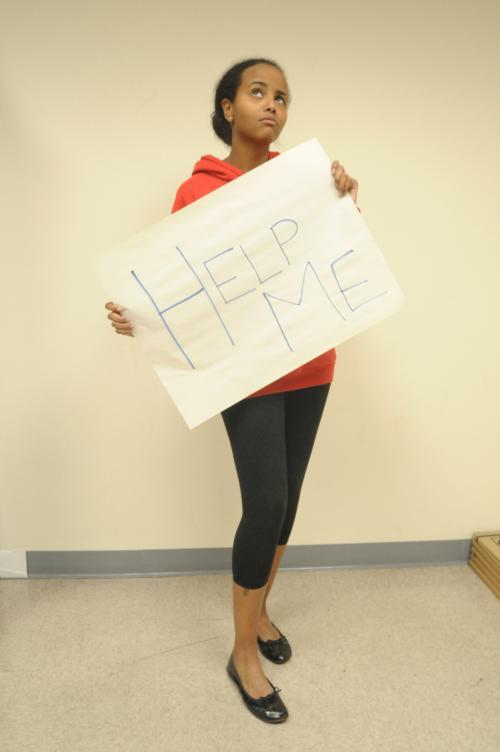
[NOT] Escaping Icescapes
I’ve had many “how the hell did I get here” moments in my life.
The most bitter of these is still as vivid a memory as my last trip to Berryline. I was outside alone one day during the summer after my sophomore year of high school, slowly disintegrating under a sweltering sun. Obviously the occasion, which sprawled over four hours, was ripe for serious introspection. My reflection that day was absorbed by one simple and painfully obvious realization: something was terribly, terribly wrong with this picture.
Perhaps it was the heavy, unwieldy sign that concealed more than half of my body, or the fact that I was teetering on a curb and frantically waving at oncoming traffic. Perhaps it was the fact that my arms had begun to feel like two throbbing, slightly numb vestigial appendages, or that I was beginning to see spots in the heat. Mostly, it was one persistent little number that had been pulsing in my head for the past 240 excruciating minutes:
$4.25.
That, minus taxes, was how much I was being paid for each hour of increasing delirium and dehydration. No benefits, no breaks, and no entertainment. Worst of all, I had just stumbled upon this unpleasant new figure by receiving my first paycheck for two weeks of blissfully ignorant labor. You see, friends, the federal minimum wage was $5.15, and the wage I had been promised was a full $6.00. $4.25 was neither of these. But alas! The worst part of this predicament was that I was stuck, unless I was willing to fritter away the rest of my summer bored out of my mind and unemployed.
As an underaged high school student in a college town, I had already experienced that summer as a season of humbling mass rejection. This was the first year I could officially work, and at the outset the prospect of earning my own pocket money had been fresh and exciting in the way only foreign concepts can be.
At first, I went for the cream of the crop—cafés, book shops, the hip record store I frequented downtown—but before long I realized the hard truth of age discrimination: my love for Kierkegaard and my carefully cultivated jeu d’esprit meant less than nothing to The Man at Borders who saw the number “16” on my application and, without so much as a glance at my qualifications, tossed it in the shredder for sustainable recycling.
So I set my sights lower: ever the ambitious young upstart, I accrued 30 generic applications at even more generic establishments only to have the majority swallowed up and effectively lost forever in some pile on an assistant supervisor’s desk. Occasionally I would hear back, but the response was invariably a flat rejection or, once, a confused call from a hardware store clerk who inexplicably assumed I came with Y chromosomes and could lift 200 lbs. I was so desperate at this point I tried to play along, but eventually he found me out.
Enter IceScapes Italian Ice & Frozen Treats, a modest joint near my house that sprung up in a building previously occupied by a fast food chain. I was initially attracted by the “NOW HIRING” sign in the window, but quickly fell in love for other reasons. It seemed like I’d stumbled upon my dream job, and they hired me with no hassle. “IceScapes is fairly informal,” said Ron, the avuncular owner who bore an uncanny resemblance to a life-sized teddy bear, “We let you play whatever music you like.” As he said this, Ron gestured to a boom box by the freezers and noted that he was a Jurassic 5 fan; as I surveyed the large central room I even recognized some friends from high school among the four or five employees—in fact, nearly everyone who worked there was 16 or under. By the time I’d signed away my summer I was already playing the fond memories in my head: IceScapes would be all fun, friendship, and frozen treats.
Unfortunately, what were originally sources of excitement soon turned sour. I learned that there were no qualifications because I was relegated to manual labor: whether I was churning the italian ice every fifteen minutes, tackling a never-ending pile of dishes, or furiously scrubbing all manner of surfaces, I was always occupied by a paranoid and micromanaging Ron, who seemed to be perennially watching me for the slightest mistake. I also discovered that the staff at IceScapes was so young and inexperienced because of an astronomical turnover rate, and that my “friends” from high school—employees for a full three months longer than myself—felt quite comfortable ordering
me around like the wretched serf that I was. Furthermore, when Ron told me that “you” could select music, I hadn’t realized that “you” actually meant my supervisor, Allie, who had one simple rule: Ashlee Simpson. On repeat.
The $4.25 an hour was the final insult. On the first payday I even attempted to sow the seed of discontent among my coworkers, heavily referencing OSHA to no avail. I became bitter, seeing my associates as nothing but hapless lambs waiting to be slaughtered, content with their slave wages and unwilling to stand up for justice. Then again, I was a raging hypocrite in that I didn’t quit myself: it was far too late in the summer to even hope for another job, and I decided that I preferred exploitation to ennui. So I grabbed my sign and headed out the door, brimming resentment in my heart and “L.O.V.E.” stuck in my head.
—Asli A. Bashir ’10 is a History and Literature concentrator in Currier House. She still only makes $4.25 an hour.


